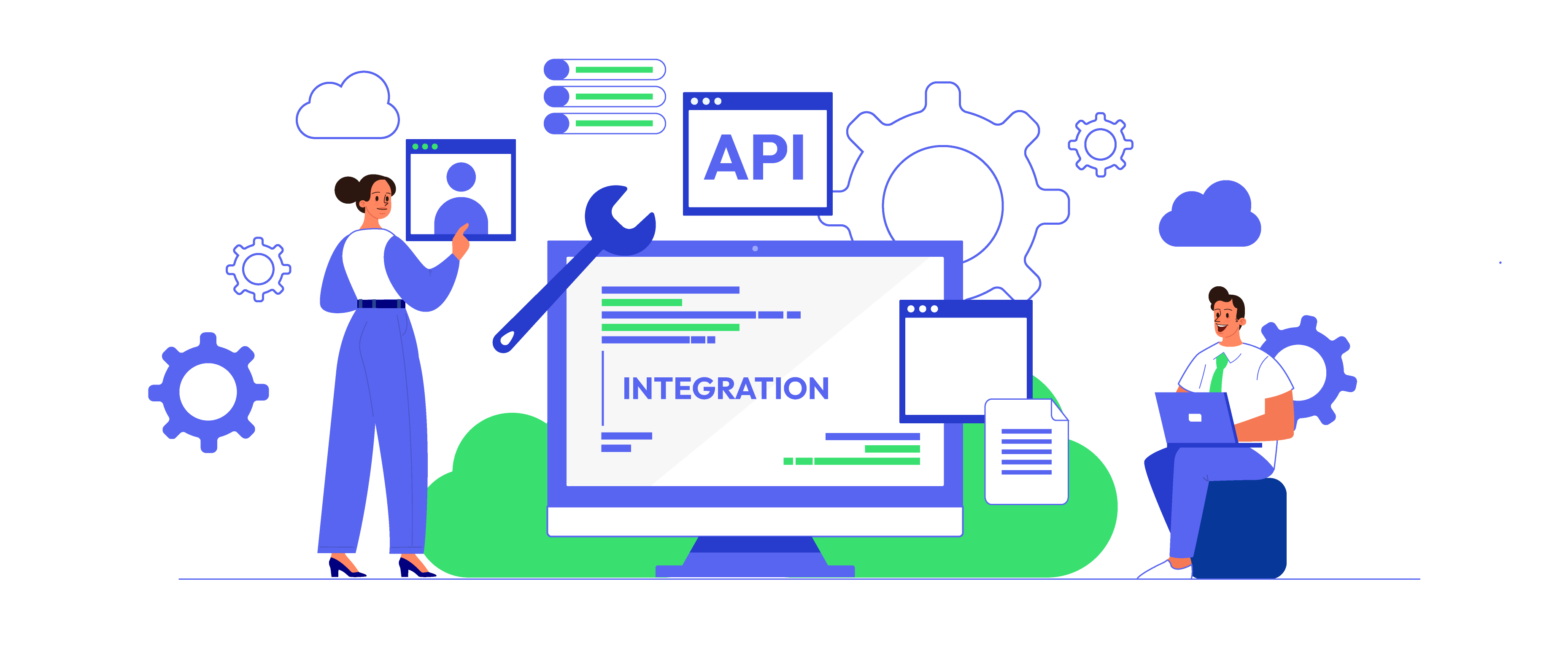Top 10 Headless Commerce Software for B2B Businesses in 2023
Summer Nguyen | 11-09-2023
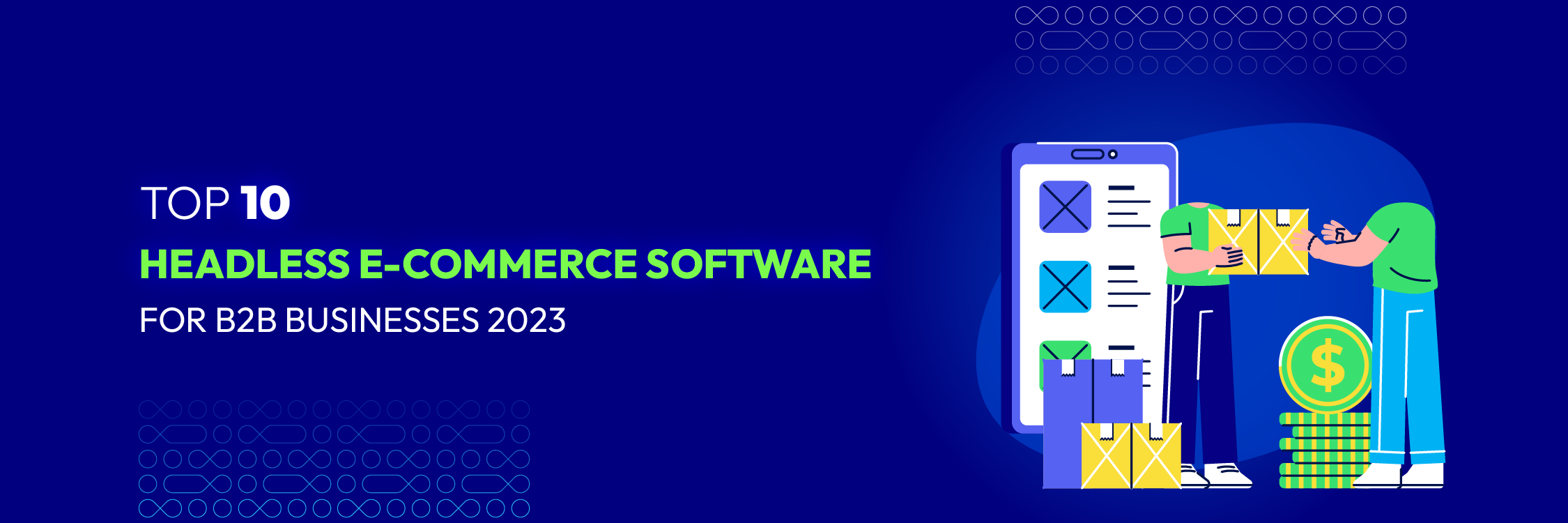

The Most Popular Extension Builder for Magento 2
With a big catalog of 224+ extensions for your online store
By 2025, eCommerce is projected to constitute 24.5% of global retail, spanning B2B and B2C sectors. To thrive in this space, flexibility is key. Your platform should enable seamless front-end customization without disrupting back-end operations like shopping carts and order processing. Likewise, back-end adjustments shouldn’t impact the customer-facing experience.
With numerous options available, our guide highlights the top 10, each offering distinct advantages. Before we explore the top headless commerce software, let’s start with the fundamentals.
Table of Contents
- What Are Headless CMS and Headless Ecommerce Platforms
- Headless Ecommerce vs. Traditional Ecommerce
- How Does It Help?
- What to Look For in a Headless Commerce Platform
- Ecommerce Platforms that Support Headless Approach
- Summary
What Are Headless CMS and Headless E-commerce Platforms?
Imagine you operate a sizable e-commerce establishment with an intricate product inventory and an expanding clientele. As your enterprise grows, your current e-commerce platform fails to offer the degree of adaptability and personalization essential to accommodate the evolving demands of your customers. This is where a headless Content Management System (CMS) steps in.
A headless CMS affords you greater flexibility and scalability in shaping the customer-facing aspect of your platform, all while maintaining a robust backend.
The concept extends beyond just CMS. A related term, “headless ecommerce,” refers to the separation of the front-end and back-end of an ecommerce application. This architectural approach empowers brands to craft user experiences that go far beyond conventional ecommerce stores. Most notably, it grants brands the ability to enhance the customer experience.
If you’re keen on delving into the world of headless architecture, you can explore how to construct a front-end using React & WordPress, integrating a headless CMS into your ecommerce framework.
Headless Ecommerce vs. Traditional Ecommerce

While the average user might not immediately notice it, there are significant differences in the structure of headless commerce software when compared to the traditional approach. Both methods have their specific use cases, but as your requirements become more complex, a headless system often emerges as the superior choice.
In the realm of B2B headless commerce software, there is extensive room for customization, providing developers with nearly limitless options to tailor and personalize the platform to meet customer demands. If you’re in need of a system that can handle tasks such as cross-border sales, cryptocurrency acceptance, and generating product recommendations based on purchase history, a headless system is capable of achieving all these and more.
In contrast, traditional B2B ecommerce systems tightly integrate their front-end and back-end, relying on their close connection. These are well-suited for basic solutions that don’t require non-standard functionalities. However, they face challenges when attempting to incorporate new technologies and can present usability issues.
The trend of headless ecommerce is on a consistent rise and gaining more popularity when compared to conventional ecommerce, as evidenced by Google Trends data.
How Does It Help?
The distributed assets are fetched to the front-end (including mobile, web, smartwatch, etc.) via APIs, resulting in a notably quicker experience because this process only involves retrieving the assets necessary for rendering the front-end.
Headless ecommerce is an ideal choice if:
- Your marketing strategy relies on content as a driving force.
- You seek the capability to implement personalization, artificial intelligence (AI), or augmented reality (AR).
- You have various touchpoints and devices, and you aim to create seamless digital experiences across them.
- You have requirements for multi-site or global sales, serving multiple front-end experiences powered by the same back-end.
- You are already using a content management system (CMS) in which you’ve made investments, and you wish to incorporate ecommerce functionalities.
- You are currently selling content online through a different website, but you want the ability to merge the two seamlessly.
What to Look For in a Headless Commerce Platform
Headless ecommerce platforms have gained popularity among businesses seeking enhanced flexibility and customization. However, with a multitude of options available, choosing the right one can be a daunting task.
Now, let’s explore what to look for in a headless commerce software to aid businesses in making informed decisions.
Security
Ensuring strong security measures within headless commerce software is paramount to safeguard customer data and financial transactions. Robust security builds trust with customers and shields ecommerce operations from potential cyber threats.
Cost
Cost considerations are essential when evaluating headless commerce software. Pricing can vary significantly, so it’s crucial to find a solution that aligns with your budget while also helping you maximize profits. Evaluate the pricing structures of different providers to choose the one that offers the best value for your investment.
Integration Capabilities
Integration is vital in headless ecommerce, ensuring a seamless experience for both customers and businesses. Well-functioning APIs facilitate a smooth front-end user experience, while the back-end efficiently processes orders and manages inventory. This synergy between front-end and back-end enhances the overall experience.
Headless CMS also supports integration with various analytics and reporting tools like Google Analytics and Mixpanel. This integration enables businesses to track website traffic, monitor customer behavior, and analyze sales data, offering valuable insights for data-driven decisions.
Magento API Integration Service by Mageplaza
Connect your store with any 3rd-party software and boost customer experience quickly and efficiently.
Learn moreContent Modeling Capabilities
Content modeling entails structuring and organizing content, including product descriptions, images, videos, and multimedia elements. A solid content model ensures consistency across all channels and devices, simplifying navigation for users.
Investing in content modeling, design, and approval facilitates a uniform and engaging user experience across channels and devices, potentially boosting SEO, increasing customer engagement, raising conversion rates, and fostering customer loyalty.
Customer Support
Support plays a pivotal role in headless ecommerce by assisting businesses in resolving technical issues, improving operational efficiency, and enhancing the customer experience. Support can be offered through various channels such as phone, email, chat, and self-service knowledge bases.
When selecting a headless commerce software, prioritize providers offering 24/7 support or responsive help channels. Rapid issue resolution is vital to maintaining smooth ecommerce operations.
Payment Gateway Integration
Payment gateways are essential for secure and seamless payment transactions in any ecommerce site. They also offer features beneficial to ecommerce businesses, such as fraud prevention, currency conversion, recurring payments, and support for multiple payment methods.
Therefore, opt for a platform capable of integrating various payment gateways like Square, Stripe, Apple Pay, Amazon Pay, and others.
Workflow Enhancements Architecture
A headless workflow enhancement architecture is crucial for optimizing the efficiency, accuracy, and speed of various ecommerce workflows. It streamlines and automates these processes, reducing manual effort, errors, and delays.
API-First Approach
The API-first approach is integral to headless ecommerce as it enables businesses to construct flexible and scalable ecommerce systems that seamlessly integrate with other systems and services. This approach offers benefits like independent scaling, customization, and easy integration with third-party software.
Ecommerce Platforms that Support Headless Approach
1. Magento

Magento is an open-source ecommerce platform that empowers online retailers with a dynamic shopping cart system and comprehensive control over the appearance, content, and functionality of their online stores. It boasts robust marketing features, search engine optimization tools, and catalog management capabilities.
Customizability: Yes, Magento is highly customizable thanks to its open-source architecture and modular design, allowing businesses to tailor their online stores to their specific requirements and preferences.
Pricing: Magento Open Source is free and open-source, making it accessible to a wide range of users. However, there is also a paid version called Magento Commerce, with pricing starting at $2,000 per month, offering additional features and support for larger enterprises.
2. Shopify Plus
Shopify Plus offers robust headless commerce capabilities by seamlessly integrating with various Content Management Systems (CMS) and front-end solutions to create virtual storefronts across web, mobile, and other platforms. The Storefront API facilitates rapid and engaging storefront design while maintaining smooth integration with Enterprise Resource Planning (ERP), Product Information Management (PIM), Customer Relationship Management (CRM), and CMS systems. It provides user-friendly pre-built solutions but also offers the flexibility for skilled developers to further customize it. Shopify Plus is particularly well-suited for mid-market and enterprise businesses.
Shopify, on the other hand, is primarily designed for small to medium-sized businesses, while the newer Shopify Plus is specifically tailored for larger enterprises. Although the core services are similar, Shopify Plus is capable of handling significantly higher loads compared to a standard Shopify plan.
Customizability: Yes, Shopify is customizable through its app store, themes, and API.
Pricing: Shopify’s pricing starts at $29 per month.
3. BigCommerce
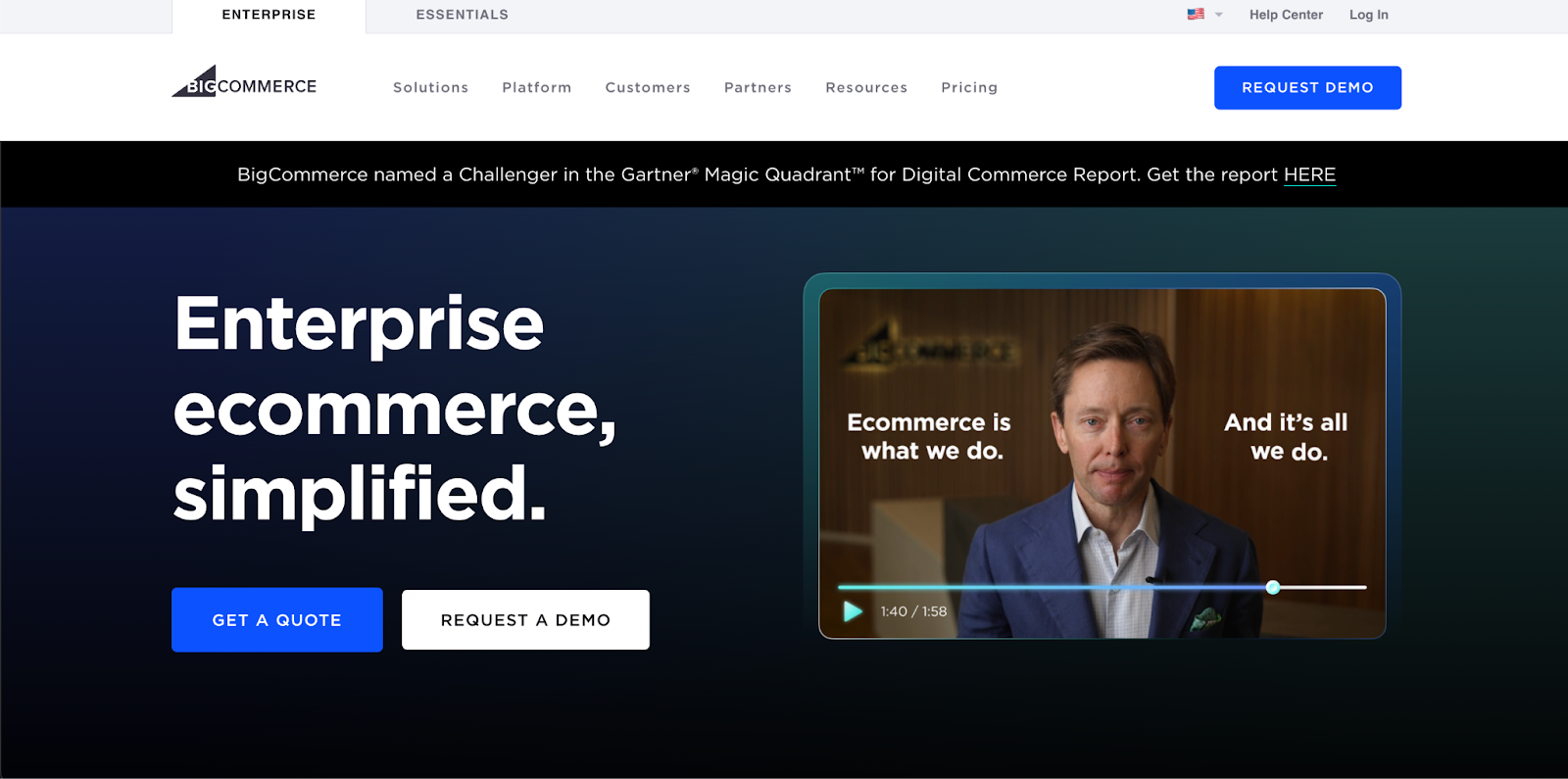
BigCommerce is a widely used ecommerce platform designed for the creation and management of online storefronts. It simplifies the process of setting up your shop, adding products, and generating revenue through your ecommerce website. BigCommerce is particularly well-suited for large enterprises or rapidly expanding businesses, offering a wealth of built-in features and data resources to support their growth.
Customizability: BigCommerce offers customization options through various apps that enable you to personalize and tailor your BigCommerce store according to your specific needs and preferences.
Pricing: BigCommerce provides a one-month free trial for users to explore the platform. Paid plans start at $29.95 per month.
4. CommerceTools
CommerceTools is a cloud-native technology company that specializes in offering a headless commerce software. In this approach, the frontend and backend of an application are decoupled and communicate through an API (Application Programming Interface). This flexible API allows businesses to interact with their customers across a variety of platforms, including mobile apps, websites, and social networks. CommerceTools’ methodology empowers retailers to create innovative and captivating customer experiences that enhance brand recognition. It also provides them with complete control over the implementation and hosting of their online store.
Customizability: Yes, CommerceTools is highly customizable, primarily due to its API-first approach and modular architecture. This flexibility allows businesses to tailor their commerce solutions to meet their specific needs.
Pricing: CommerceTools pricing starts at $500 per month and can vary based on the number of API requests generated by your store, making it adaptable to different business sizes and requirements.
5. ElasticPath
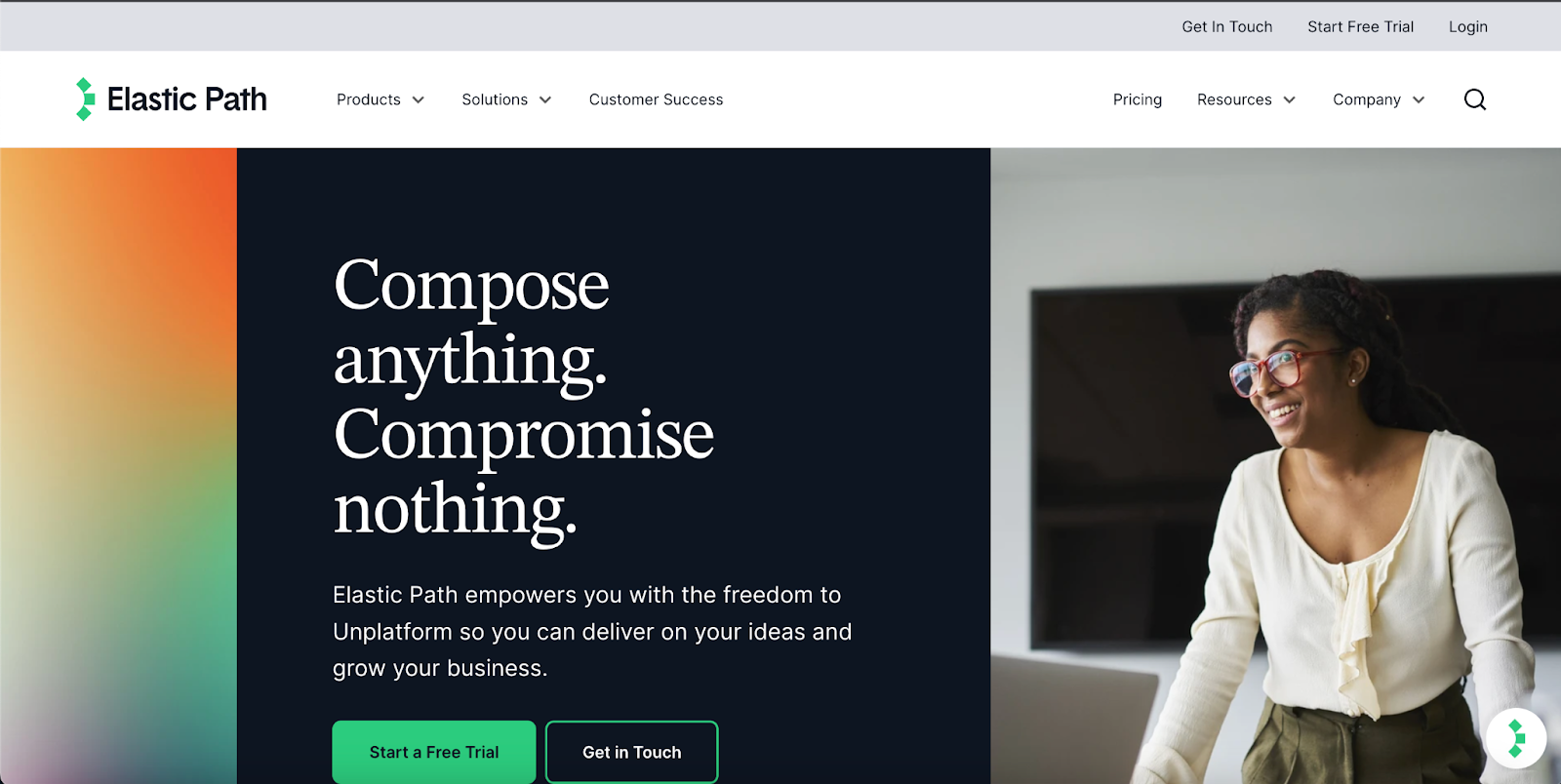
Elastic Path is a versatile headless commerce software that relies on APIs, serving a wide range of industries like retail, manufacturing, automotive, and healthcare. Within its Core Commerce module, it offers functionalities such as catalog management, merchandising, and reporting. This empowers marketers to tailor their offers in accordance with customer purchasing patterns.
You can deploy this platform either on-premise or in single and multi-tenant SaaS environments. It also provides an API for seamless integration with third-party applications. Elastic Path empowers businesses to oversee both physical and subscription-based services, establish digital storefronts, and bundle products to streamline operations.
Customizability: Users have the freedom to construct, personalize, and expand the platform according to their specific needs and preferences.
Pricing: The initial pricing begins at $50,000.00 per month, but it can escalate depending on request volume, product quantity, and revenue generated.
6. Moltin
Moltin is a digital commerce solution that offers adaptable APIs, developer toolkits, ready-made applications, and cloud infrastructure. It empowers retailers to craft distinctive shopping experiences accessible through various channels and devices. Its user-friendly APIs make it simple for retailers to experiment with new channels and expand into fresh markets swiftly. Moltin boasts a thriving global community of over 17,000 developers who are innovating beyond the confines of conventional commerce.
Customizability: Absolutely! Moltin is customizable through the use of APIs.
Pricing: Moltin’s pricing starts at $20.00 per month.
7. SAP CX Commerce Cloud
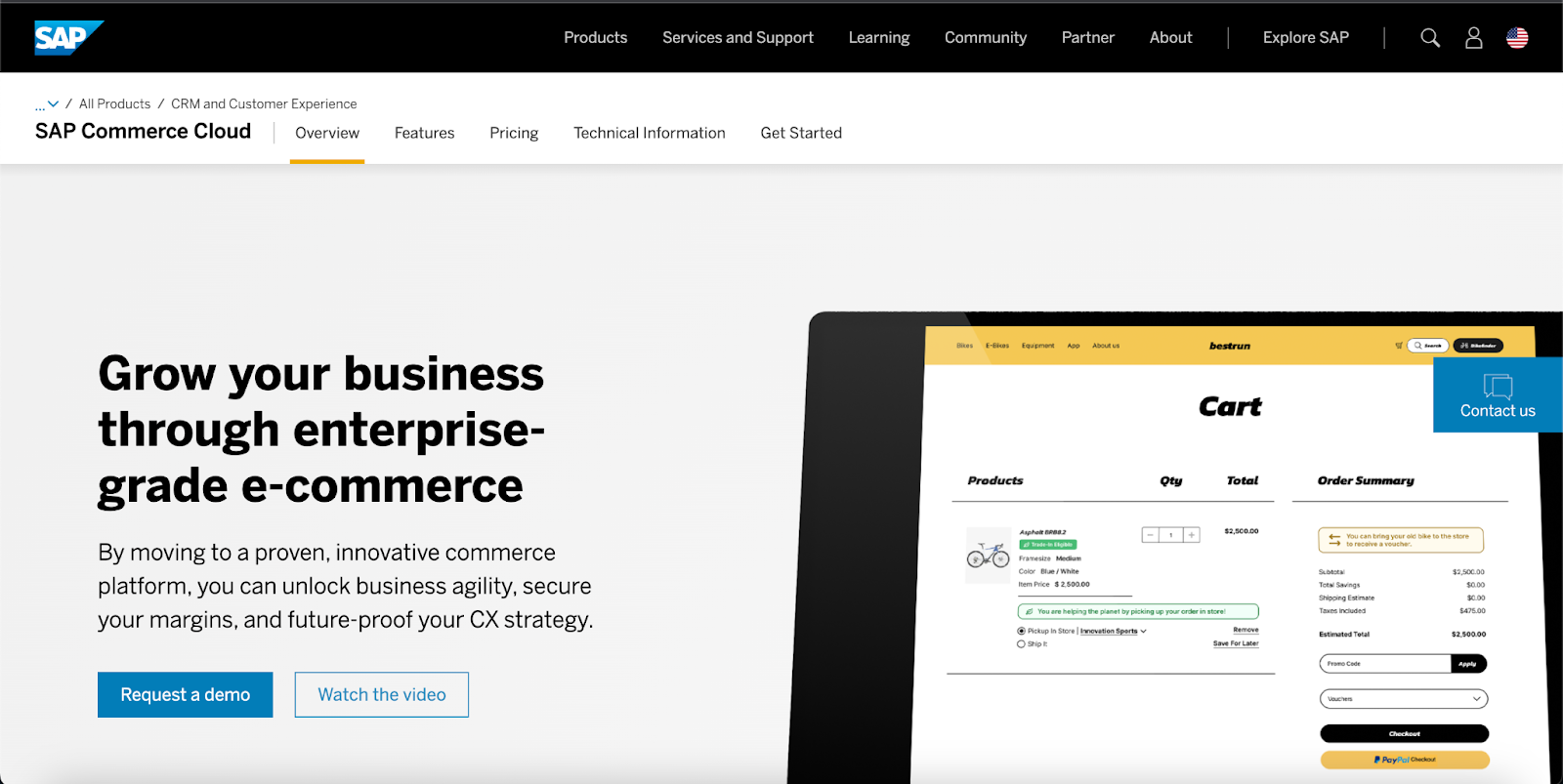
SAP Commerce Cloud stands out as a leading solution for businesses seeking to efficiently oversee their communications, sales, and customer support efforts across all platforms. It centralizes control over product data, ensuring it’s prepared in a format suitable for any media.
This headless commerce software empowers businesses to establish and maintain their online stores across various channels. Furthermore, it equips business owners to provide tailored experiences to their customers, drawing on their browsing and purchase history, preferences, and behavior.
SAP CX Commerce Cloud seamlessly integrates with both SAP and third-party systems, offering real-time insights and analytics regarding sales, customer behavior, and engagement. This invaluable data enables business owners to make informed, data-driven decisions.
Customizability: Absolutely, SAP Commerce Cloud adopts an API-first approach, making it straightforward for users to extend and tailor their websites to meet their specific needs.
Pricing: The pricing for SAP Commerce Cloud is set at $100,000 per year per license.
8. OroCommerce
OroCommerce is a B2B ecommerce software designed to meet the needs of medium and large-sized companies. It comes with integrated CRM functionality and offers seamless integration with third-party applications. Its out-of-the-box features can be adjusted to suit various B2B, B2B2B, B2B2C, or B2B & B2C commerce requirements. The headless commerce softwrae offers a range of tools for corporate account management, access control, permissions, content management, and more, making it an excellent choice for businesses aiming to streamline their ecommerce operations. OroCommerce is an open-source solution, providing businesses with the flexibility and scalability needed to adapt to changing market demands.
Customizability: Yes, OroCommerce allows you to create a fully customized ecommerce website.
Pricing: Pricing for OroCommerce starts at $45,000.00 per year.
9. Snipcart
Snipcart is an ecommerce solution designed for businesses looking to enhance their existing websites with shopping cart functionality. It encompasses a range of features including a merchant dashboard, customer dashboard, payment gateways, and inventory management. Users can easily upload product data, construct catalogs, and generate promotional codes. The platform also facilitates shipping solutions, account creation, and provides individual customer dashboards. One of its key advantages is the quick and straightforward integration process, which typically takes developers minutes, not hours, for a basic setup.
Customizability: Indeed, Snipcart is highly customizable thanks to its API-based architecture and integrations.
Pricing: The pricing for Snipcart starts at $10 per month.
10. FoxyCart
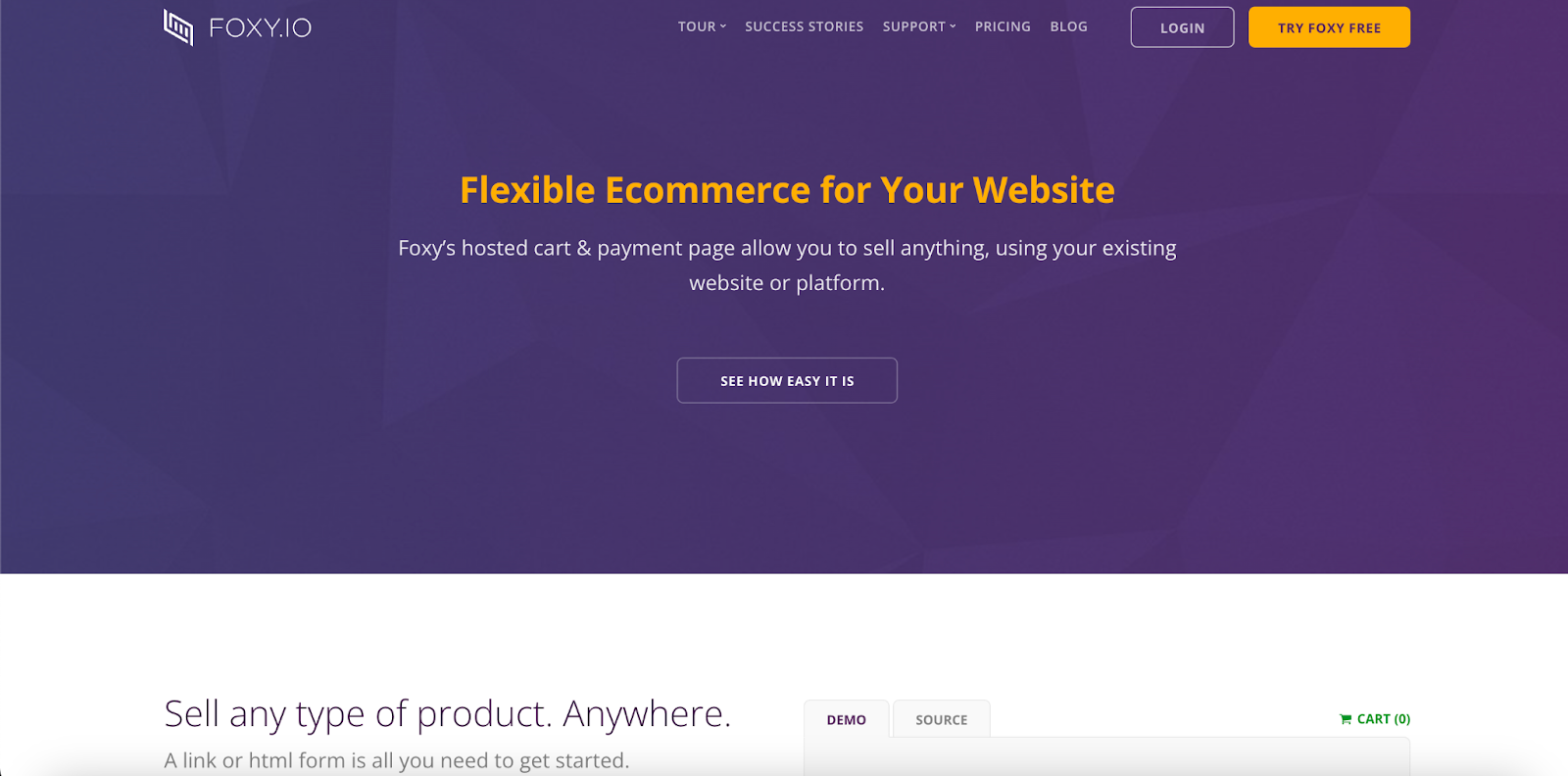
FoxyCart is an ecommerce platform primarily aimed at web developers and designers, enabling them to build fully customizable online shopping carts. It provides extensive flexibility in designing the store, cart, and checkout process, ensuring it can adapt to the unique business models of its users. FoxyCart emphasizes rapid and hassle-free shopping experiences through its quick checkout flow. Integration is straightforward and can be accomplished with a simple link or form. While it lacks integrated content management and marketing systems, more advanced users have the freedom to employ their preferred tools for added convenience.
Customizability: FoxyCart offers high levels of customization thanks to its availability of headless APIs.
Pricing: FoxyCart’s pricing starts at $21.25 per month.
Summary
In order to stay competitive in the online marketplace, it’s absolutely essential for companies to produce high-quality content and embrace the right headless commerce software to elevate the digital experience for their customers.
To address this, we’ve spotlighted 10 of the top-notch headless commerce software and 15 CMSs that offer support for headless functionalities in our blog. Each of these options delivers remarkable value, ecommerce capabilities, and opportunities for optimization, catering to both small and large ecommerce operations.
Whether a business is focused on B2C or B2B ecommerce, there exists a headless commerce software tailored to their precise needs. By leveraging these CMS hosting services, businesses can craft tailor-made front-end and back-end solutions to adapt to evolving customer demands, all while retaining their relevance through a headless approach.

